Boniface VIII, The Man Who Would Be Pope
To paraphrace Carl von Clausewitz, violence is politics by other means. When debate and discussion just becomes too difficult, it can be very tempting for those involved to take “direct action” instead. History is littered with examples of people who didn’t realise they were playing with matches in a gunpowder store and pushed their luck just a little too far, from the Gracchi brothers to the Girondins. One of those who made this deadly miscalculation was Pope Boniface VIII, a man who thoroughly overestimated the power that he was able to command.
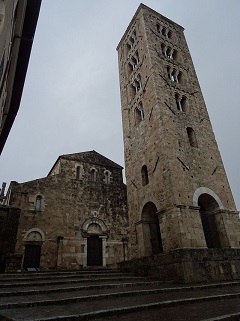
Pope Boniface was born as Benedetto Caetani in 1230 AD. His family were part of the nobility of the Papal States, a territory in Italy that had been put under the direct rule of the Pope by the great emperor Charlemagne in the 8th century. The Caetani family claimed descent from a patrician gens of ancient Rome, but at the time they had little claim to fame. Power in the Papal States was of course, inextricably tied to the priesthood. Benedetto’s best connection to this was through his mother, who was the niece of a cardinal named Rinaldo di Jenne. Other relatives of Benedetto were also priests and bishops, and it was not surprising that he joined their number.
Benedetto was studying in the city of Todi (where an uncle of his was bishop) in 1254 when his mother’s uncle Rinaldo became Pope Alexander IV. The new pope gave his grandnephew the post of canon at the cathedral in Anagni, his hometown. Anagni would become Benedetto’s seat of power in times to come. At the age of 34 Benedetto became a member of the Curia, the civil service of the Vatican. He was attached as a secretary to Cardinal Simon de Brion, a French priest who was unsurprisingly appointed as papal legate to France. This was Benedetto’s first exposure to the world of international diplomacy that was central to the power of the papacy.
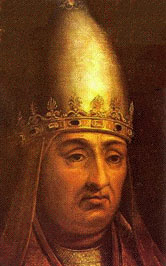
The following year Pope Urban IV (who had succeeded Alexander) died. Though the new pope Clement IV confirmed de Brion as French Legate, the shakeup seems to have resulted in Benedetto being reassigned. He traveled to England as part of the entourage of Cardinal Ottobano, where he would spend three years. During this time the Cardinal was heavily involved in resisting the attempts by Henry III’s rebellious barons to tax the church lands in their districts. The cardinal also paid witness to the oldest piece of English law still in effect to this day, the Statute of Marlborough. This law still makes it illegal eight hundred and fifty years later for tenant farmers to wreck the land they rent, and for people to try to recover damages outside of the court system.
Details of what Benedetto got up to after 1268 are a bit thin on the ground, but that’s not unsurprising. The death of Urban IV that year threw the entire church into chaos. Urban IV had been fiercely pro-French, and had installed several French cardinals – almost, but not quite, enough to take control of the church. However as the French Cardinals were willing to support the Holy Roman Emperor Charles of Anjou in his planned invasion of Italy, the Italian cardinals were well motivated to oppose whoever the French tried to put into power. The election took place in the city of Viterbo, where Urban IV had died, as was traditional at the time. Things were deadlocked for literally years, and in 1270 the magistrates of Viterbo (at the urging of European monarchs) took the drastic step of locking the Cardinals into the Papal Palace until the pope was elected. When this proved ineffective, they went on to restrict the cardinals to a diet of bread and water, and even removed the roof of the palace (allegedly “to let the Holy Spirit shine down and guide them”).
Finally in September of 1271 (nearly three years after they began the election), the cardinals agreed to elect a six-man committee who would chose the new pope. The committee chose an archdeacon named Teobaldo Visconti, who was participating in the Ninth Crusade at the time. Once the new pope was crowned (after first being made a priest and then a bishop, as was required) he immediately et about reforming the papal election system, naturally enough. The system set up by Gregory IX (as he was named) was based on the regime that had been imposed on the cardinals at Viterbo – sequestration, and a bread and water diet if no conclusion had been reached after eight days. Perhaps even more effective was the rule that cardinals would not be entitled to any payments from the church’s treasury for their offices during the length of the conclave.
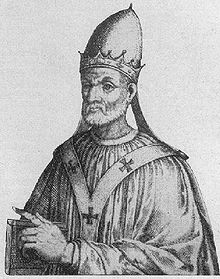
Gregory died in 1276 and was succeeded by Innocent V, but Innocent died after only a few months as Pope. Such were the perils of appointing old men to a job in days of low life expectancy. He was succeeded by Benedetto’s first superior, Cardinal Ottobano, who took the name of Adrian V. Adrian didn’t even live long enough to be crowned, as he died less than a month after being elected. [1] He may not have had much chance to help Benedetto, but he could have been behind Benedetto getting a diplomatic posting to France that year. Over the next few years Benedetto moved up the ranks, and in 1281 his career got a major boost when his old mentor and friend Simon de Brion was crowned as Pope Martin IV. Martin was not a popular Pope, as the Italians were very hostile to the French at the time. [2] In fact, he never visited Rome throughout his pontificate. As a result, he needed supporters among the cardinals. This is probably why he promoted Benedetto to Cardinal-Deacon (the lowest rank of cardinals) later that year.
As a Cardinal, Benedetto found himself caught up even more in the politics surrounding the Holy See. Given his shaky local support, Martin IV found himself thoroughly under the thumb of the Holy Roman Emperor Charles of Anjou. This strongly influenced his position in the rebellion known as the Sicilian Vespers. Charles had conquered Sicily in 1266, but in 1282 the locals successfully rebelled and massacred the local French population. The islanders tried to have themselves made members of the Papal States, but despite the obvious advantage Martin was too thoroughly under Charles’ control to go against him. As a result the islanders petitioned Peter III of Aragon to be their king, leading to a war between two of Europe’s great powers – with the papacy in the middle. The conflict raged on until the death of Charles, Martin and Peter in 1285. After this the younger son of Peter became king of an independent Sicily that would go on to become part of a unified Spain until the 18th century.
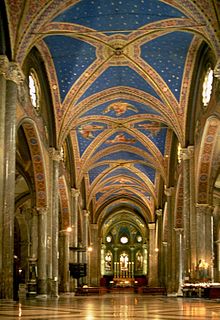
Benedetto advanced rapidly through the ranks of the Cardinals, aided by a mortality rate that saw them down to only a dozen in 1292. That year, when Pope Nicholas IV died, he found himself embroiled in yet another deeply troubled papal election. One of the cardinals died during the election, leaving them down to only eleven electors, and by the rules eight of them would need to agree on their choice. The problem was that at the time the race was dominated by Roman factionalism between the Colonna and Orsini families, each of whom were determined to take control of the papacy. The election was also slowed because they ignored Gregory’s rules and took breaks between debating sessions. The election went on until the summer of 1294, when they received a letter from a hermit named Pietro de Morrone. He told them that God would punish any further delays. One of the cardinals, who had heard of Pietro by reputation, decided to nominate him for the papacy. The other cardinals, aware of the need for a compromise, swiftly agreed. As a result the unsuspecting hermit was elected Pope Celestine V.
Pietro was initially unwilling to be pope, and may even have tried to escape from the messengers. Eventually he was persuaded to accede to the election. He was not unfamiliar with authority – he had previously been the leader of an order of monks he had founded fifty years earlier. After he took the name Celestine they became known as “the Celestines”. For most of the time since it had been founded he had lived as a hermit though, and he found it hard to reacclimate himself to normal life. This may have been why he allowed himself to be controlled by King Charles II of Naples, though this could also have been a strategic alliance to avoid becoming enmeshed in the schemes of the Cardinals and the Curia. However it happened, he turned out to be a singularly ineffective Pope, memorable only for two landmark changes he made to the papacy.
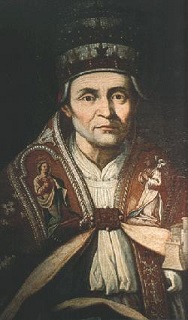
The first of these, prompted by the issues around his own ascension, was to take the proposed papal election reforms of Gregory X and make them binding. The rules of conclave and isolation of cardinals would be enforced for every papal election thereafter. The second was one that came after about a year and a half of his reign, and was informed by deep conversations with Cardinal Benedetto Caetani. Many would later find that deeply suspicious. This change was simple enough: Pope Celestine V made it permissible for a Pope to resign the papacy. This he then fairly promptly did.
The church was immediately divided over the legality of Celestine’s resignation. Many saw it as having been forced upon him, and fingers were pointed at Benedetto. This intensified when, after a single day of conclave, Benedetto was elected as the new Pope. Many began muttering that Celestine was still the true Pope, and so Benedetto and others began to fear he would be set up by some faction in a grim replay of the Anti-Popes of years gone by. As a result Celestine was not permitted to return to his hermetic lifestyle but was instead held in close confinement for the rest of his life under guard.
Benedetto took the name of Pope Boniface VIII. His primary ambition was to raise a new Crusade, and most of his efforts for the next few years would be trying to get relative peace in Europe so he could persuade rulers to commit to this. This led to Boniface’s interference in the dispute over control of Florence between the Black Guelphs (who supported his papacy) and the White Guelphs (who opposed it). Dante was in the White party and wound up being exiled from Florence due to Boniface’s intervention. Because of this he was one of the many popes who Dante Alighieri put into Hell when he wrote the Divine Comedy. It’s notable though that Boniface was actually alive at the time, so a dead Pope mentions he was going there rather than he actually appearing.
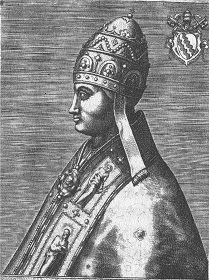
The new Pope also faced some issues with rebellious cardinals, most notably those from the Colonna faction. Giacomo Colonna and his nephew Pietro were both cardinals, and both had openly aligned themselves with people Boniface considered enemies (specifically the Spanish kings of Aragon and Sicily). An opportunity to put the Colonnas back in his place came when Giacomo disinherited three of his brothers and confiscated their lands for the family. They appealed to the pope, and he took their side. When Giacomo defied the pope’s judgement, Boniface expelled him (and Pietro) from the college of cardinals and excommunicated them. In response Giacomo and Pietro declared that Celestine’s resignation, and Boniface’s election, had been illegal. [3] The pope’s response was swift. He appointed one of the estranged Colonna brothers the commander of his forces, and sent him out to bring their lands back under papal control by force. This he did with ruthless efficiency, razing three towns to the ground in the process.
Boniface’s attempts at international diplomacy were generally unsuccessful. For example, he tried to persuade Venice and Genoa to call a truce to their latest interminable conflict over trade, to no success. He tried to influence the Sicilian succession, but was ignored. He attempted to restore John Balliol, the King of Scotland, to his throne but the English king Edward paid no attention to his orders. Perhaps his most successful action was his declaration of the year 1300 as the first ever Christian “Jubilee Year”, when pilgrims to Rome could attain indulgences and forgiveness for their sins. The practice has been repeated many time since. On the other hand, the pope’s least successful action was, without a doubt, his conflict with King Philip the Fair of France.
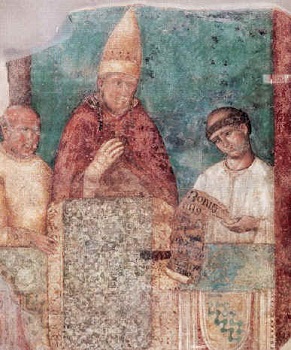
The conflict between Philip and the church was deep-rooted, and stemmed from his belief in the supremacy of his royal power. He excluded clerical lawyers from his government, and sought to restrict the power churchmen had. When he started to tax them, though, Boniface decided he had gone too far. The pope issued a Bull declaring that taxing church members and properties without papal approval was rounds for automatic excommunication. In response Philip blocked all funds moving from France to the Papal States, cutting off a major source of the church’s income. He also put an immediate stop to Boniface’s attempts to raise a new crusade. The pope backed off, and issued a face saving bull that gave the king permission to determine taxation on the clergy – fulfilling the letter of his previous bull. Philip then lifted his restrictions, and things seemed to have calmed down.
The peace between the two didn’t last though. The King continued to chip away at clerical authority, and when Boniface appointed a papal legate well known for his opposition to Philip he was arrested for fomenting an insurrection. Philip sent to Rome for the authority to try the priest, but the Pope responded with a bull condemning the arrest. It was the provocation Philip had been waiting for. He had his chancellor distribute a distorted translation of the bull, which inflamed public opinion against the Pope and led to a belief that he was trying to make himself the ruler of Christian kings. A forged papal bull “Deum Time”, “Fear God”, was also circulated around France to back up this claim. Philip burned the bill publicly before a cheering crowd, signifying his utter disdain for Boniface’s authority.
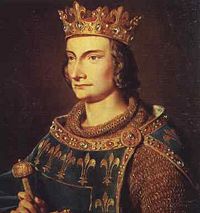
Things continued to escalate through 1302. The French clergy were divided, with some publicly declaring their support for Philip, while others defied his orders to travel to Rome for a council held by the pope. This culminated in November of 1302 with the release of one of the most infamous Papal Bulls in history – “Unam Sanctum”, “One Holy”. This declared in unequivocal terms that there was no salvation outside of the Roman church, that the pope was head of that church, and that therefore submission to the pope was necessary for eternal salvation – even for monarchs. This was a clear challenge to Philip, and was followed by excommunication and then further sanctions. Philip was not the sort of person to take this lying down, and in a trial backed up by his loyal French clergy he declared Pope Boniface a heretic and a criminal. It was now an open conflict between the two men.
Boniface wasn’t trying to go it alone against Philip, though. King Albert of Germany, who had been allied with Philip against the pope, agreed to switch his allegiance in exchange for papal recognition of his shaky throne. Albert was in line to be Holy Roman Emperor, and this was probably why Boniface also declared that France should be under the emperor’s control. With Albert’s backing, he must have felt he had little to fear in open conflict with Philip. What he wasn’t expected was conspiracy and treachery, from an enemy he thought he had defeated.
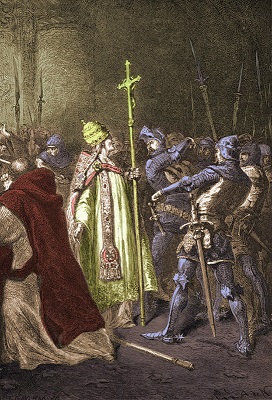
Sciarra Colonna was a nephew of Giacomo, keenly aware that his family were in danger of being permanently sidelined. Guillame de Nogaret was a French noble and councilor to King Philip. The two of them came together and came up with a plot to capture Boniface and take him to France to stand trial for heresy. They gathered a band of sixteen hundred mercenaries in the Appennine Mountains near Anagni, where Boniface would often go on retreat. On September 7 1303 they struck. Their men stormed into the town and overwhelmed the pope’s guards, under a French banner. The papal palace held out for a few hours before the mercenaries broke in through the cathedral. When they got to the main hall, they found Boniface fully dressed in his papal regalia, holding the keys of his office in one hand and a cross in the other, seated on his throne and calmly awaiting their arrival.
The conspirators demanded that the pope resign, and Boniface replied that he would sooner die. An enraged Sciarra Colonna struck him across the face, and witnesses say that it was only Guillame’s interference that prevented him from killing Boniface there and then. Instead they held him under guard while they plundered the papal palace. Before they could set out for France, the people of Anagni banded together and mounted a rescue. Guillame and Sciarra were forced to retreat, and the pope was free once more.
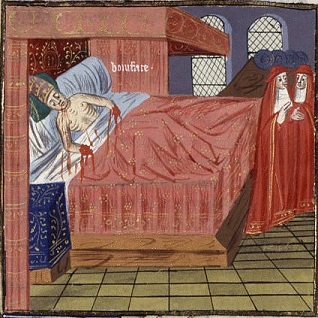
The “Outrage of Anagni”, as it became known, could have easily turned international opinion against Philip and led to Boniface regaining all that he had lost. It definitely would have ended badly for the Colonna family to be caught in such base treachery. As it turned out though, Sciarra Colonna had managed to succeed in his aims after all. The seventy-three year old pontiff fell ill after his imprisonment, an illness that seemed as much mental as physical. He became deeply depressed, but also developed a high fever. Some contemporary accounts said that he railed and ranted and even that he chewed his hands off at the wrist in a frenzy. (An exhumation of his body in the sixteenth century showed this to be false, as his hands were still intact.) He died on the 11th October 1303, and with him died the last resurgence of papal authority over monarchs.
With Boniface dead the cardinals felt compelled to elect a pope who would not be hostile to Philip. The new pope, Benedict XI, did un-excommunicate the king, but he did also excommunicate all those who had been involved in the Outrage of Anagni. He died suddenly eight months later. At the time Guillame de Nogaret was rumoured to have had him poisoned though there was no evidence for it. He was succeeded by a French pope, Clement V, who was so far under Philip’s thumb that he actually moved the seat of the papacy out of Rome and to Avignon just outside the French border. [4] The next six popes would all reign in Avignon under French control, until it ended in a schism with rival popes in Avignon and Rome.
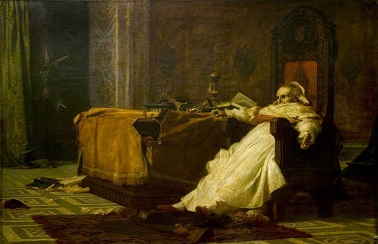
With this level of control over the papacy, Philip was able to get away with moves such as his violent suppression of the Templar order. Ostensibly this was because they were heretics, but in reality it was almost certainly because Philip owed them a great deal of money. He was also able to take his revenge against the man who had defied him, by forcing Clement to put Boniface posthumously on trial for heresy. However the whole thing degenerated into such a mess of perjury and obviously fake charges that the pope was forced to declare that perjury at the trial would be grounds for excommunication. Eventually the decision was deferred to a church council, who decided that Boniface VIII was not a heretic after all.
The legacy of Boniface has always been tarnished by his unusual accession and by his violent deposition. The English poet John Gower, writing eighty years later, claimed that Boniface had engineered Clementine’s resignation by having a priest whisper to him as he slept and pretend to be the voice of God. At the other end of his reign, the specter of a pope seeking to dominate the rulers of the world was one that would haunt Europe for centuries to come and would prove to be one of the major drivers of the Reformation. It’s ironic that the man whose sole goal was to unify the church and re-establish the power of the papacy over the temporal authorities may instead have been one of the reasons for the events that would so thoroughly reduce its power.
Image via wikimedia.
[1] He was succeeded by Pope John XXI. Oddly, there was no John XX – at the time it was believed that there had been two Pope John XIVs by mistake, so John XXI “fixed it”. Nowadays it’s believed that there actually only was one Pope John XIV, so the fix was itself a mistake.
[2] He was elected after two of his enemies among the Cardinals were kidnapped by a mob during the elections.
[3] Some sources also claim they robbed the papal treasury, saying that Boniface had no right to the money.
[4] The absence of the pope allowed the Colonna family to dominate the papal states.
